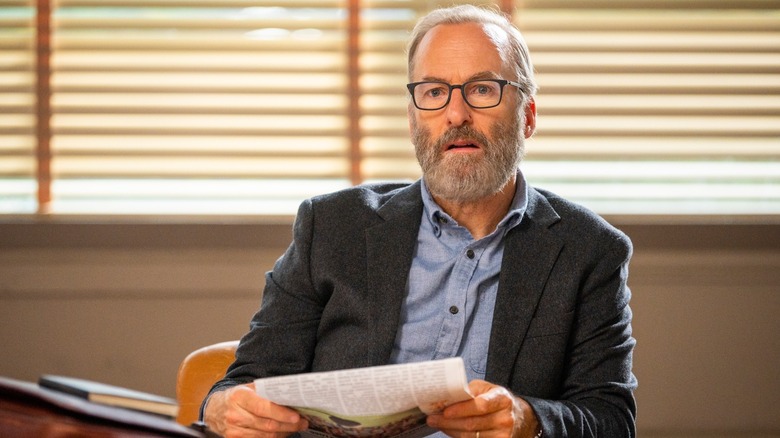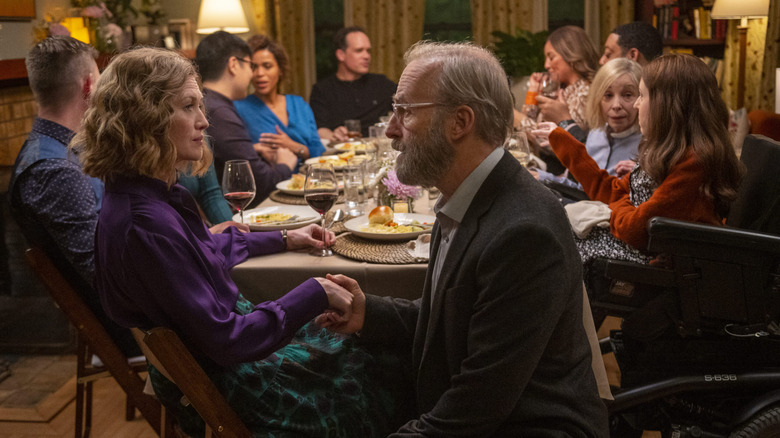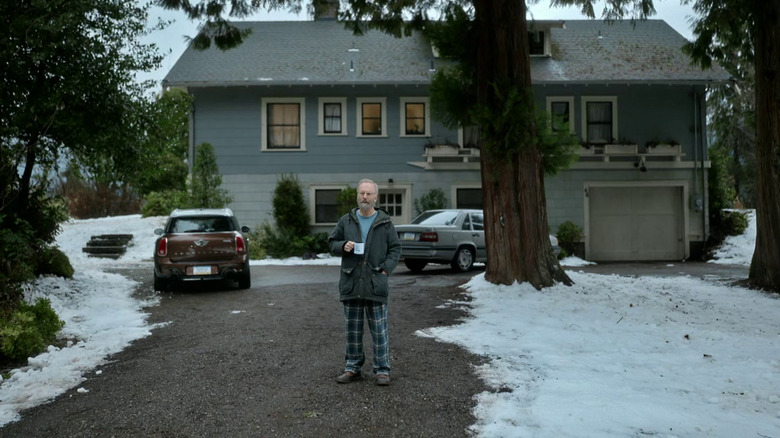This Canceled Bob Odenkirk Comedy With 96% On Rotten Tomatoes Deserved More Time
I firmly believe that Paul Lieberstein and Aaron Zelman's dark comedy drama "Lucky Hank" was exactly what Bob Odenkirk needed after his magnum opus "Better Call Saul" wrapped in 2022. Although there was an attempt to turn him into another Liam Neeson (an unlikely action star at the tail end of his 50s) with "Nobody," I thought that was rather undignified. He spent 10 years in two of the best TV shows of the last two decades, proving how quaint, meticulous, and complete an actor he was. And Hollywood's reaction was to cast him in a dumb and bombastic action movie spawned by "John Wick." I was glad he got some leverageable mileage and a likely decent paycheck out of it (the film was a box office success), but I also feared it would steer him in the wrong direction — and, in a way, it did because "Nobody" eventually got a sequel (here's our review).
Before that, though, his third AMC series, "Lucky Hank," was supposed to be his ticket to a potential line-up of quality dramas and witty satires that just didn't happen. Ironically, it's the best work he's done after "Better Call Saul," but also the very series that may've sucked away many TV opportunities from him because it failed to attract a big enough viewership.
I'm still unsure how that happened. As its high Rotten Tomatoes score illustrates, critics loved it (including me) for good reason: it was sharply written, facetious in all the right moments, and stacked with a particularly fitting cast that was meticulously picked for a show about academia. Sure, you could argue that a story about burnt-out, middle-aged professors and underachieving teachers isn't exactly the most alluring subject, but the sophisticated and caustic humor with which the writers operated was carefully balanced to appeal to both intellectuals and philistines alike. Cocky wannabe writers, jealous and obnoxious colleagues, and middle fingers thrown in the air are universal to everyone after all — or so I thought.
Lucky Hank was slow-burn but incredibly rewarding, too
"Lucky Hank" might've been too niche to capture a wider audience, but that happened to be both its strength and weakness. Its spiritual predecessor was a 2021 Netflix series called "The Chair," led by a wonderful Sandra Oh, which suffered a similarly sad fate after its brief first season. That show also delved into the struggles of a chairman in an English department at a university, was well-received and praised by critics, yet quite underseen and short-lived, too. But if you ask me, "Lucky Hank" is the better of the two due to its willingness to dig deeper into personal struggles and traumas in order to deliver a profound character study.
The plot follows Odenkirk's Hank Deveraux Jr., a grumpy and dissatisfied English professor, who doesn't miss a chance to fully live through every miserable moment of his surging midlife crisis. He's also a writer with a novel that nobody read (even if they say they did) and is out of print, trying to follow in the footsteps of his well-accomplished and deeply respected novelist father, whom he's been estranged from for decades. Hank is drowning in a professional and individual ennui, which he seems to have gotten used to by now. His ambitions are lukewarm, and to muster up some motivation to achieve any of them may as well be a task equivalent to finding the cure for cancer. He's too old, resigned, and listless to make an effort to get out of the mental and emotional rut he (and his environment) put himself in. He says, "Being an adult is 80 percent misery." The older you are with goals you haven't achieved yet, the more you might find that sentence to be true.
But the truth is that Hank doesn't have all the legitimate reasons to feel this way. He's got a nice house, a reliable, if unfulfilling, job, and a circle of supportive friends and family. His wife Lily (Mireille Enos) knows the ins and outs of his self-wallowing and misanthropy as well as how to help him keep them in check. His daughter is bright, even if too self-involved in her own life to truly see what's happening to her dad. And then there's Hank's closest friend, Tony (Diedrich Bader), who comes and goes in and out of the picture as he sees fit. Trouble truly kicks off when Hank bursts into a monologue in one of his writing classes, telling his students off and declaring this sorry-ass college as the capital of mediocrity. As expected, the incident quickly spirals due to a voice recording of Hank's outburst, captured by another student in his class.
That's the setup, bringing on a myriad of problems for our hopeless hero at his job — dealing with his insufferable, envious, and often snobby colleagues, along with the school's prickly dean — but the root of his unhappiness lies elsewhere. And throughout the 8-episode first season (based on Richard Russo's 1997 book, "Straight Man"), the writers take us there to get the full picture.
Lucky Hank neatly captures midlife crisis and our inability to choose direction at metaphorical crossroads that life often puts before us
Some critics and viewers claimed that "Lucky Hank" couldn't find a bigger and more loyal audience because it was too slow-paced and directionless. But how can anyone say that when its protagonist is literally defined by his slow-moving, depressing everyday life and his inability to find a footing during his blossoming midlife crisis? Hank lives in misery and self-pity — simultaneously angry at the world and his place in it — and the show depicts that state of mind and wallowing with an amusingly bitter humor and scathing cynicism.
In essence, "Lucky Hank" is about a man acting out because he's no longer able to put up with the boredom and listlessness that made him this way. Odenkirk embodies this mixture of feelings with a charisma that makes him both pitiable and relatable. As a character, Hank is practically the opposite of Saul Goodman, yet Odenkirk manages to find its nuances in the same painstaking portrayal he did with that savvy and shameless hustler in Vince Gilligan's beautifully twisted Albuquerque universe.
"Lucky Hank" might draw you in with its absurd satirical humor, but you'll stay for all the ambivalent and uncomfortable feelings rooted in a very personal trauma — one that will shock your heart into a devastating realization when you're finally faced with it alongside Hank. AMC's cancellation of this criminally underseen gem is one of the most painful ones from recent years (right alongside "Scavengers Reign") because it could have given us so much more to appreciate. Not to mention that ever since it ended, Odenkirk hasn't been able to find another truly fitting role that fully lets him exercise those muscles that made him one of the most intriguing character actors to watch in the past 10 years.


